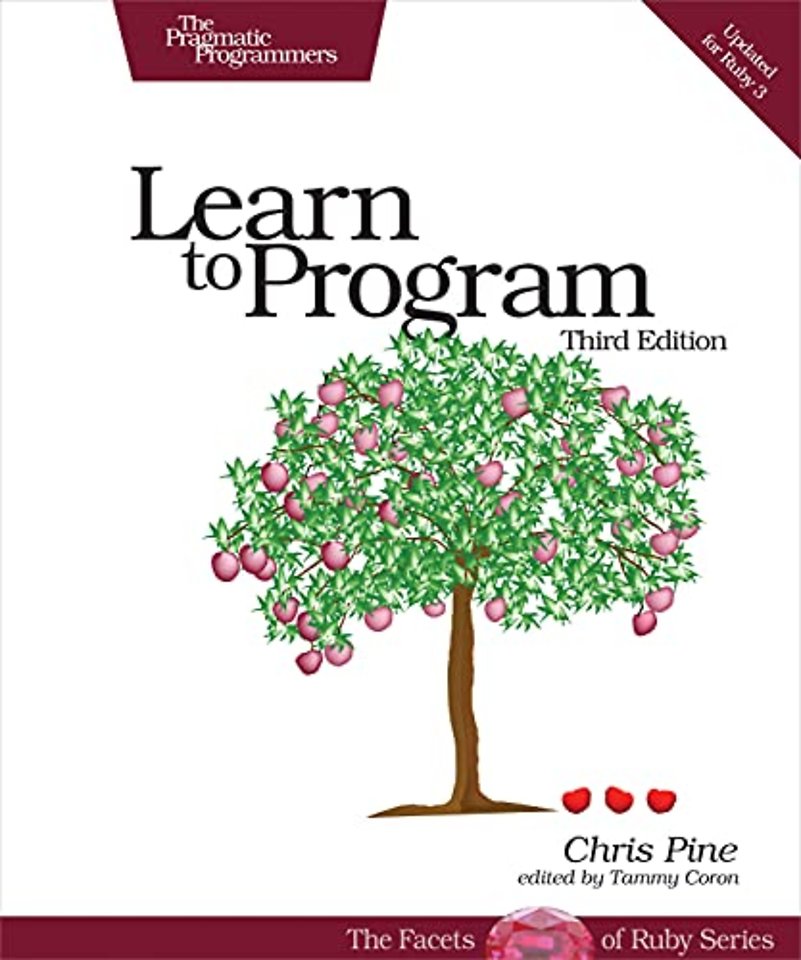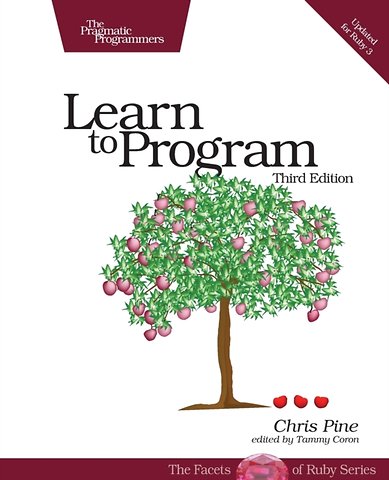


Programmer Chris Pine first discovered the programming language Ruby in early 2001 and immediately began using it to build tools for his day job: programming computer games.
Meer over Chris PineLearn to Program
Updated and revised
Samenvatting
It's easier to learn how to program a computer than it has ever been before. Now everyone can learn to write programs for themselves - no previous experience is necessary. Chris Pine takes a thorough, but lighthearted approach that teaches you the fundamentals of computer programming, with a minimum of fuss or bother.
Whether you are interested in a new hobby or a new career, this book is your doorway into the world of programming. Computers are everywhere, and being able to program them is more important than it has ever been. But since most books on programming are written for other programmers, it can be hard to break in.
At least it used to be. Chris Pine will teach you how to program. You'll learn to use your computer better, to get it to do what you want it to do.
Starting with small, simple one-line programs to calculate your age in seconds, you'll see how to write interactive programs, to use APIs to fetch live data from the internet, to rename your photos from your digital camera, and more. You'll learn the same technology used to drive modern dynamic websites and large, professional applications. Whether you are looking for a fun new hobby or are interested in entering the tech world as a professional, this book gives you a solid foundation in programming.
Chris teaches the basics, but also shows you how to think like a programmer. You'll learn through tons of examples, and through programming challenges throughout the book. When you finish, you'll know how and where to learn more - you'll be on your way.
What You Need:All you need to learn how to program is a computer (Windows, macOS, or Linux) and an internet connection. Chris Pine will lead you through setting set up with the software you will need to start writing programs of your own.
Specificaties
Inhoudsopgave
What’s New in This Edition
Introduction
-What Is Programming?
-Programming Languages
-Installation and Setup
-The Art of Programming
Numbers
-Printing to the Screen
-Integers and Floats
-Simple Arithmetic
-Progress Checkpoint
Letters
-String Arithmetic
-Numbers vs. Digits
-When Bad Things Happen to Good Programs
-Progress Checkpoint
Variables and Assignment
-Variables Point to Values
-Progress Checkpoint
Conversions and Input excerpt
-Numbers to Strings and Back Again
-Let Me Tell You a Secret
-Getting Strings From the User
-Cleaning Up User Input
-Good Variable Names
-Progress Checkpoint
Methods
-Fancy String Methods
-More Arithmetic
-Random Numbers
-The Math Object
-Progress Checkpoint
Flow Control excerpt
-Comparison Methods
-Branching
-Looping
-A Little Bit of Logic
-Progress Checkpoint
Arrays and Iterators
-My First Iterator
-More Array Methods
-Progress Checkpoint
Custom Methods
-Method Arguments: What Goes In
-Local Variables: What’s Inside
-Experiment: Stuby
-Return Values: What Comes Out
-Progress Checkpoint
File Input and Output
-Really Doing Something
-The Thing About Computers…
-Saving and Loading for Grown-Ups
-JSON
-Back to Our Regularly Scheduled Programming
-Renaming Photos
-Progress Checkpoint
More Classes and Methods excerpt
-The Time Class
-The Hash Class
-The Range Class
-Stringy Superpowers
-Classes and the Class Class
-Progress Checkpoint
Custom Classes and Class Extensions
-A Few Things to Try
-Creating Classes
-Instance Variables
-new vs. initialize
-The Care and Feeding of Your Baby Dragon
-Progress Checkpoint
Remote Data and APIs
-Random Internet Jokes
-Respect
-Trivia Database
-Location of the ISS
-Where Did I Put My Keys?
-Movie Search
-Progress Checkpoint
Blocks and Procs
-Methods That Take Procs
-Methods That Return Procs
-Passing Blocks (Not Procs) into Methods
-Progress Checkpoint
The Mind-Bending Magic of Recursion
-A Method So Easy, It Calls Itself
-Rite of Passage: Sorting
-Progress Checkpoint
Beyond This Fine Book
-irb: Interactive Ruby
-The PickAxe: Programming Ruby
-Ruby-Doc.org
-Online Search
-Stack Overflow
-Tim Toady
-THE END
Installation and Setup on Windows
Installation and Setup on macOS
Installation and Setup on Linux
Possible Solutions
Anderen die dit boek kochten, kochten ook
Net verschenen
Rubrieken
- aanbestedingsrecht
- aansprakelijkheids- en verzekeringsrecht
- accountancy
- algemeen juridisch
- arbeidsrecht
- bank- en effectenrecht
- bestuursrecht
- bouwrecht
- burgerlijk recht en procesrecht
- europees-internationaal recht
- fiscaal recht
- gezondheidsrecht
- insolventierecht
- intellectuele eigendom en ict-recht
- management
- mens en maatschappij
- milieu- en omgevingsrecht
- notarieel recht
- ondernemingsrecht
- pensioenrecht
- personen- en familierecht
- sociale zekerheidsrecht
- staatsrecht
- strafrecht en criminologie
- vastgoed- en huurrecht
- vreemdelingenrecht





